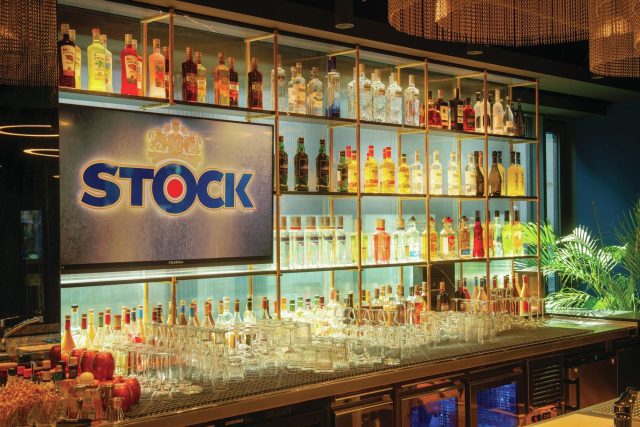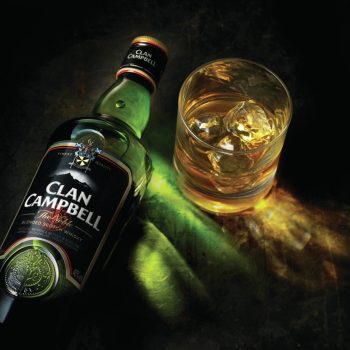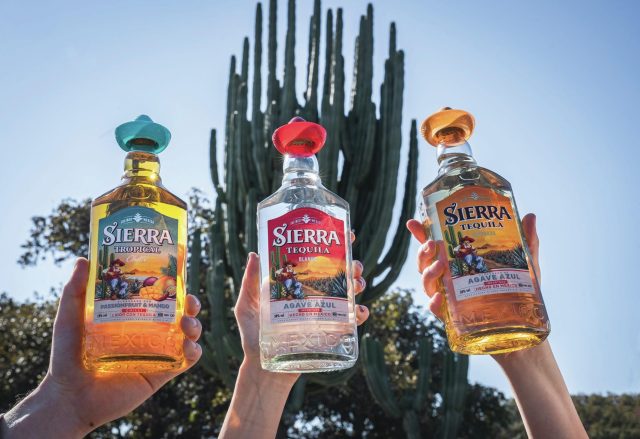The big interview: Stock Spirits
By Melita KielyHaving recently bought German family-owned company Borco, Stock Spirits Group is carving out a lucrative niche in the mainstream of the spirits industry, as CEO Jean-Christophe Coutures tells us.

Two consumer insights stand out in the present climate, says Stock Spirits Group’s CEO, Jean‐Christophe Coutures. First, consumers are looking for value-for-money brands, “good quality at an affordable price”. Second, they are increasingly drawn to locally made products.
“A lot of our competitors, a lot of large companies, have been very successfully globalising their brands, and premiumising their portfolios, moving strongly towards the super‐premium segment,” he explains.
“I think this strategy is right – but I think today there is, as well, very strong demand from consumers for good, value‐for‐money brands, and local brands.” It is a different approach to the constant chase for premium-plus success.
Low-premium brands
Based on these beliefs, Coutures, the CEO of Stock Spirits Group since August 2022, has been building the company’s strategy based on five key pillars: local iconic brands; Europe as a focus market; mainstream, “low-premium” brands; controlling the company’s own routes to market; and ensuring all production and distillation is vertically integrated into the business.
“We want to focus a lot of our investment and strategy in Europe, so we are not looking at expanding strongly in Asia or going to Africa,” Coutures explains. “We believe in mainstream, low‐premium as our key category. This is where we want to play. Our ambition is to become the leading mainstream spirits company by 2027/2028.” While inflation, supply chain issues and cost‐of‐living pressures impacted much of the spirits industry in 2023, it did little to diminish Stock Spirits Group’s expansion plans. The Warsaw‐headquartered company completed four acquisitions in the second half of 2023 alone – including buying Clan Campbell Scotch whisky, Sierra Tequila owner Borco, French distributor Dugas, and vodka producer Polmos Bielsko‐Biała.
“When Stock Spirits was taken over by [investment firm] CVC Capital Partners in 2021, the company was making a €350 million (US$391m) turnover,” Coutures says.
“In 2023, a year ago, we were making a €450m turnover. We grew our turnover by almost a third over a two‐year period, showing our dynamism in Central Europe. This year, we will bring our turnover to around €760m to €800m.
“So we have almost doubled our turnover, which shows the significance and the magnitude of what we’ve been achieving in 2023.”
When it came to buying Hamburg‐based Borco, the decision was based on more than its strong stable of brands. Stock Spirits has strong ties to Poland, “and we’re operating in the Czech Republic and Slovakia”, notes Coutures. These markets sit in close proximity to Germany, a “dynamic market” that is high on the agenda of Stock Spirits’ European expansion plans – and Borco is well connected there.
“When you look at the dynamism of Germany as a market, it is one of the largest markets in Europe,” says Coutures. “When you look at the results of some of our competitors, they are doing very well in Germany, and we feel that it’s a market where there is a need for a very strong mainstream player to operate. Currently, the bigger competitors are doing very well in Germany, but they are playing in the premium‐plus segment.”
Coutures saw the potential for a company outside of private labels, and premium and super‐premium brands to succeed in this space. This, he says, is where Borco was playing, but without the portfolio that Stock Spirits could offer. “Vodka is a big category in Germany, and the second‐biggest spirits category in Europe,” Coutures explains. “Vodka from Russia used to be a significant brand in the German market. But since 2022, those brands have almost disappeared from the market. Today, there is a very strong push for vodka from Poland to grow in the German market, so we felt we had an opportunity to introduce our vodka there,” he explains. He also compliments Borco’s “aggressive” development of Sierra Tequila over the past five to 10 years throughout Europe, particularly in the UK. “We felt having access to one of the very dynamic categories in the mainstream segment would represent a significant opportunity for us, as we could expand this Tequila in Central Europe in particular,” he says.
Strong talent
Borco was a family‐owned business before the takeover. Integrating the firm into Stock Spirits Group has included renaming Borco as Stock Spirits Germany, and hiring a new leadership team – “strong talent”, Coutures says. “I strongly believe in empowerment,” he explains. “I have a decentralised culture, so I want to empower a leader. So, my first task when we acquired Borco was to find the right person to lead the team. I was lucky enough to find Nicolas Rampf [managing director, Stock Spirits Germany], who joined us [in January 2024 from Bacardi] based on our growth‐agenda project. We’ve been recruiting new people at pace. We’ve been changing the leadership team, and now we have a fully new team in [Stock Spirits Germany], which is driving our growth agenda.”

Investment in Germany will continue to be heavy. The company has already tripled its marketing budget in the region, Coutures reveals. While he is unable to share an exact figure, he says “we will invest at threshold”. “We are running a new campaign on Sierra, as well as one on Finsbury Gin. The choice was made to invest in Sierra and Finsbury to drive the velocity and awareness of these brands in the German market,” he explains. France is also set to become a focal market for Stock Spirits Group now that French distributor Dugas is under its ownership. The country is the second‐largest spirits market in Europe, Coutures says, describing it as “very dynamic. It’s very responsive to innovations.” Stock Spirits Group plans to create new brands in the French market: “We want to develop a new brand in the rum segment,” Coutures reveals, as well as the aperitivo category, vodka, Tequila, and low alcohol. “We felt that Dugas was the perfect match for us, a company that has significant presence in the off‐trade, where we can develop Clan Campbell, for example.”
The French market
There is a fully operating team in the French market now working for Dugas, spanning the on‐trade and off‐trade, led by managing director Marianne Loing. The team will move to a new office in Paris in early October, and more than 60 people have been recruited throughout the organisation. And with distribution agreements already signed with Diageo and Suntory Global Spirits, to name just two, it’s clear to see why such numbers are needed – especially with Stock’s recent portfolio growth.
As previously mentioned, last year Stock Spirits Group added Polish spirits producer Polmos Bielsko‐Biała to its vodka catalogue. “Polmos Bielsko‐Biała is the strongest brand in Poland in the premium vodka segment,” says Coutures. “This was a big gap in our portfolio because consumers are moving up to better brands, and we felt it was important for us to have a brand in our portfolio where we could accompany this premiumisation movement in the vodka segment.” But doesn’t this go against the overall mainstream, low‐premium strategy?

Well: “So yes, we bought a premium vodka, but it is sold in Poland below US$10 a bottle. So it remains an affordable, good value‐for-money brand in the vodka segment, and still very relevant to our strategy.”
Stock Spirits Group also has grand plans to grow in the Scotch whisky space after buying Clan Campbell from Pernod Ricard. The group is planning to build a £25m (US$32m) whisky distillery and visitor centre at Inveraray Castle in Scotland. A planning application was submitted in June this year. The site will span 950 square metres, with a distillery capable of producing up to two million litres of alcohol annually. If the plans are approved, construction will begin early next year, and distillation is scheduled to start in 2027.
“This distillery will produce a single malt that will be used to make Clan Campbell,” says Coutures, who previouly served as CEO of Pernod Ricard’s Scotch whisky arm, Chivas Brothers. “This will really be the heart of the brand. We want to give that brand a lot of its legacy, making sure it is rooted in Scotland with its own distillery. We want to double the size of Clan Campbell by 2028, moving from 1.5m to between 2.5m and 3m cases. We want this brand to become the disruptive Scotch whisky at very good value for money. So we want to innovate; we want to innovate in the low‐alcohol space. We want to innovate in the cask‐finishing space. We want to innovate in the flavour space.”
Growth Strategy
Having just launched in Poland, Central Europe will also be key to Clan Campbell’s growth strategy. The brand is already enjoying strong traction in Spain, Italy, Germany and Austria, and Coutures says the group aims to go “a bit harder in the UK”. There are no plans, however, to bring Clan Campbell’s production entirely in house. While the single malt portion of the blend will eventually come from the new distillery, Stock Spirits intends to continue working with the brand’s long‐trusted third‐party suppliers of grain whisky.
However, a new single malt whisky brand is in the pipeline. “The name of that brand is still to be defined but, yes, in line with our DNA, we’d like to offer a good value‐formoney single malt for consumers throughout Europe.” This will be an unpeated single malt, Coutures insists. The barley will be sourced locally, along with the water – just the tip of the company’s sustainable endeavours.
In August, Stock Spirits Group published its new sustainability strategy, alongside its inaugural sustainability report for 2023. The sustainability strategy has three values at its core: people, planet and processes. Targets include eliminating all plastic sleeves and pourers from primary packaging by 2026, and ensuring all gift boxes are 100% recyclable. The firm has committed to reducing its greenhouse gas emissions in scope one and two by 42%, and in scope three by approximately 20% by 2030. “Level one and two is everything that is in your control. Level three is when your customer and your suppliers are involved as well,” Coutures says.

Sustainability agenda
“As a leader, I’m fully convinced that a company that has a sustainability agenda is a company that will attract more talent, that will partner with better suppliers, and will therefore partner with better customers. If you want to be part of an ecosystem and to be credible and respected, there is no way we can do that in a B2C business without having a proper sustainability agenda.”
It is also important to Coutures, who adds: “I’m very sensitive about this topic. If I was to talk to you about my personal life, I invested personally in a country house in France and I tried to make this place, at the heart of the forest in the south‐west, very sustainable because I truly believe that it’s very important for the planet.”
EcoVadis is a platform that helps companies improve sustainability across their supply chains, and comply with growing regulations. Companies are rated bronze, silver, gold and platinum, depending on how they meet specific objectives. “We are silver,” says Coutures. “We are investing in all directions to ensure we can be quantified as one of the few companies that qualify as platinum.” Are consumers actively seeking products with sustainable values? Coutures notes how Gen Z consumers are “very sensitive” to the topic of sustainability, and are looking closely at what they eat and drink, and how products are made. However, he has no plans to be “in your face” with how Stock Spirits communicates its sustainable efforts to consumers, instead ensuring the information is easily accessible for those who are curious.
“We know sustainability is very important to consumers like Gen Z. As employees they want to join companies that have significant ESG [environmental, social and governance] agendas in terms of carbon emissions, worklife balance, inclusion, horizontal types of management,” he adds. “If we fail to recruit and to be a company of choice among this group, then we will disappear in 30 years.” This runs through the core values of Coutures’ immediate team, he explains. “Forty percent of my team is female,” he says. “But while we try to really drive diversity, there is no compromise on quality, no compromise on the competencies and the skills. But the beauty of a company which is newly born is you can make that company the way you want it to be.”
Stock Spirits Group has big ambitions. But there are also big issues that look set to impact businesses, at least in the short to medium term. However, Coutures is ready for the challenge. “The purchasing power of consumers throughout Europe is under pressure. Consumer confidence is low,” Coutures acknowledges. “And if you look at spirits consumption over the past two years in Europe, we’re in low‐single‐digit decline after several years of growth. Therefore, there are a lot of pressure points.
“We think a player that is playing in local brands, that offers good value for money, and is very innovative will be very successful. I believe in substance, and I want to bring all the substance that this company needs to be a leader in mainstream spirits in Europe.”
Related news
The spirits stockpile: ‘A strength becomes a constraint’
